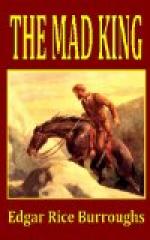“What do you want?” shouted one of the men through the closed door.
“I want Prince Peter!” yelled the king. “Send him at once!”
The soldiers laughed.
“He wants Prince Peter,” they mocked. “Wouldn’t you rather have us send the king to you?” they asked.
“I am the king!” yelled Leopold. “I am the king! Open the door, pigs, or it will go hard with you! I shall have you both shot in the morning if you do not open the door and fetch Prince Peter.”
“Ah!” exclaimed one of the soldiers. “Then there will be three of us shot together.”
Leopold went white. He had not connected the sentence of the American with himself; but now, quite vividly, he realized what it might mean to him if he failed before dawn to convince someone that he was not the American. Peter would not be awake at so early an hour, and if he had no better success with others than he was having with these soldiers, it was possible that he might be led out and shot before his identity was discovered. The thing was preposterous. The king’s knees became suddenly quite weak. They shook, and his legs gave beneath his weight so that he had to lean against the back of a chair to keep from falling.
Once more he turned to the soldiers. This time he pleaded with them, begging them to carry word to Prince Peter that a terrible mistake had been made, and that it was the king and not the American who was confined in the death chamber. But the soldiers only laughed at him, and finally threatened to come in and beat him if he again interrupted their conversation.
It was a white and shaken prisoner that the officer of the guard found when he entered the room at dawn. The man before him, his face streaked with tears of terror and self-pity, fell upon his knees before him, beseeching him to carry word to Peter of Blentz, that he was the king. The officer drew away with a gesture of disgust.
“I might well believe from your actions that you are Leopold,” he said; “for, by Heaven, you do not act as I have always imagined the American would act in the face of danger. He has a reputation for bravery that would suffer could his admirers see him now.”
“But I am not the American,” pleaded the king. “I tell you that the American came to my apartments last night, overpowered me, forced me to change clothing with him, and then led me back here.”
A sudden inspiration came to the king with the memory of all that had transpired during that humiliating encounter with the American.
“I signed a pardon for him!” he cried. “He forced me to do so. If you think I am the American, you cannot kill me now, for there is a pardon signed by the king, and an order for the American’s immediate release. Where is it? Do not tell me that Prince Peter did not receive it.”
“He received it,” replied the officer, “and I am here to acquaint you with the fact, but Prince Peter said nothing about your release. All he told me was that you were not to be shot this morning,” and the man emphasized the last two words.




